Video Conversation with Asha Saxena
Key Take Aways
Risk taking is key to controlling our destiny
Entrepreneurship is risky yet fulfilling
We need more women leaders in data & AI to avoid biases
AI Revolution is here to stay.. get involved, evolve or be left behind
Always have curiosity and a learning mindset
Full Transcript of conversation between Piyush & Asha
Piyush:
Welcome to the digital agenda. Today, our guest is Asha Saxena. She is a multi dimensional person. Very shortly you will get to know who the real person is, but I'll just share her brief bio. She's the founder and CEO of WLDA, a board member, Columbia University professor, and best selling author of The AI Factor.
She is a strategic and innovative leader with a track record of building successful technology companies over the past three decades. I have known Asha as a CEO who has done multiple exits as a person who is. Restless about getting to know more. She is very much into data analytics and women, and she's a venture capitalist and educator.
And she also happens to have traveled to a continent that I've never been to Antarctica. And she has done so many other things in life that I consider her as my role model and a mentor. So Asha, welcome to the show. Please tell the, my listeners. Who is the real Asha?
Asha
First of all, Piyush, thank you so much for having me on your show and thank you sincerely.
Thank you for saying such kind words about me. I, yeah, I have done few things and I'm sure there's, you know, they say there's yet more to come and hopefully there's a lot more fun creative, impactful things in the future. But who is Asha? I think Just truly, I think at the bottom of it all, we all are human I care too much, and I think I'm sincerely a person who cares.
Cares a lot about my world I live in and sincerely attempt to make the world a better place in any way I can, you know, in every small way, if I can leave the place a better place than when I entered that's my effort at every single place I walk in and I feel I'm truly that's what who I am.
Piyush
Beautiful! So ..You were born in India and then you came to U S. You want to highlight that journey, wherever you're born, and how you came to the U. S.?
Asha
So I was born in New York. And my parents were diplomats. So I was born in New York City. I then moved back to India when I was a year old, and I've spent most of my education growing years in India.
I came right back after graduation. You know, when you're born in New York, you have a American citizenship. So I was staying actually on visa in India and came back when I finished my graduation. And, you know, I'm an undergrad and grad in computer science, so I started my journey like everybody else who graduates in computer science as a programmer, and then very quickly started my path, growth path in corporate America, where I was in consulting from programmer to engagement manager to, you know, running a P& L, and then starting my own business.
Piyush
Wow! Normally on my show, typically, if there are Americans, of course mostly, they are born in the U. S., but you are, by the way, the first Indian (origin person) on my show, and you're the first woman on the show as well, so double distinction! You're truly outstanding, Asha. Let me ask you... What made you take your first CEO job or was it that you just started your company and said, “I want to be the CEO, So I'll start a company”
Asha
So I'm a serial entrepreneur and I fell into it. You know, I didn't have a plan, you know, being an Indian we tried taking the safe path, you know, college, get a job, stable job and continue trying to climb the ladder and do the best you can at work. And that's what my hope was.
So I joined as a programmer, you know, climb the ladder, corporate ladder. And then the company I was working for was getting acquired. And my boss called me into his room and he said and a little backstory.
I actually got married really young. I was 18 and then I had my first child immediately.
So I was in college and my mom, who's just an amazing mom. You know, I talk about my mom. I get a little. Sentimental because my mom passed away a month back, and my mom was such a great mom. And I think when people ask me people ask me about you know, my, my success. I always say that you need a village to help a woman be successful.
You know, because I, as you know, women have to take care of the kids and the family and the in laws, you know, that I mean, Extended family. And and my mom very immediately left her job and moved in and said, I'll take care of your kids. And to going back is and I have to say one more thing I'll mention about my mom.
My mom was an entrepreneur and she gave up her career to make sure that I could have a career. And I couldn't really be thankful to my parents for standing by me. And then I started my business because I was pregnant with my second child. And I was eight months pregnant and my boss called me in his room and he said, Asha you're one of the highest performers.
We are going to be getting acquired. You're on the list to get laid off. At that time, Merrill Lynch was the account where I was working, and he said we have a contract with Merrill Lynch. It's a great, great client. Let's, we want to do the right thing. We'll give you your non compete. You can work with Merrill Lynch.
And he said, Asha, you're so talented in this. I've had so many people work with me, but I really, truly believe that you can be an entrepreneur. You should start your own business. And. To have a manager early on in your career who believed in you believed in me, who not only showed me the path of how to start a company encouraged me to go ahead and do it.
I was very young. I was in my twenties pregnant with my second child. And I remember in October, my son was born and my business was born the same month. And I always say, you know, I'm twins. My one is my business. One is my child. And I still remember I delivered my son in the morning at about three, three o'clock and at 11 o'clock I call, you know, I woke up and I'm like, Oh my God.
I told my husband, like, can you please bring me the phone? Because I have to call you crazy. You realize that. So I call and I'm like, you know, our project was starting today. How's it going? Is the team there? And, and so he was like, and he, I don't know if he would ever, he's listening or whatever. Listen to this podcast.
He actually quoted me for several years. He's like, she's the one who called me from maternity ward, you know, to check on the project. So, yeah, so, so that's how my career, my journey started where I think I had the whole clan, my husband, my family, my parents. Wanted to see me successful and they just jumped right in to make sure that.
You know, my kids didn't miss a beat of family and, you know everybody was there to make sure that, you know, they were there to support me as I start my difficult journey of being an entrepreneur, but luckily, you know, we start off my start my business in nineties and, you know, in nineties. The technology boom was there, so it helped me exactly.
Helped our company grow really fast. We doubled every year. We grew to about 350 people, and it was just a great, great run. And that was my first business. And of course, after that, it was the e commerce company and the healthcare company, which I really enjoyed. The healthcare software product was You know, it's also, we want to be technically intellectually challenged, you know, challenge ourselves intellectually.
And when you're truly solving a problem that's really solving a bigger problem than just, you know, services, I feel like that's where I felt like, you know, we were creating, I was creating, or the team was creating, and the business was creating an impact in the healthcare world.
Piyush
Wonderful story. Wonderful story…Yeah, please, please kind of finish your thought.
Asha
And then, of course, I continued being a professor at Columbia. I've been teaching at Columbia University for 12 years. Wrote a book, you know, joined a management consulting firm as a partner and now running WLDA.
Piyush
Very amazing journey and the support and the gratitude that you have towards your parents and towards, especially towards your mom.
So with folded hands, I respect that feeling that you have and let's, let's shift gears and talk about data analytics. And, and build up, how did you get into why, what made you think that data analytics is going to be trending up? I have my own reasons because I started cutting my teeth in data analytics in, in that time, 90s timeframe as well.
But what was your reason?
Asha
You know we worked with, you remember, you know, coding in SQL. I think a lot of us from our era, SQL was like our. ABCD, you know, our, our basics. And so working with databases, data management is something which I did early on in my career. But really the big, big shift for me was because I was building businesses.
I cared about my metrics. I cared about analyzing the data and in my own business, I was so passionate about. What is my numbers telling me? And what is the data telling me that I understood the need for analytics? And I think the shift when we had in my business to analytics and then building healthcare company, it was all about patient data.
We're really looking at the quality metrics and becoming a really obsessed about. What data can do and and then we had to like we built in our healthcare product. This is in 2015 to 2017. We had built a model machine learning model that was predicting the readmission rate. And I remember being really concerned about the accuracies like.
If this is not accurate enough, the readmission rate is not accurate, we will not be able to save the money for the hospital system. So, I knew that we needed to have models and I knew that the models have to be accurate. So, during that time, this whole fascination towards data analytics and AI started, you know, trying to solve a cause, you know, trying to solve a problem.
How can our models be so accurate that it can truly solve the problem. And I think because I had my hands really in the sand. playing with the sand and really working with technology to understand how we can make our product better. The fascination had already started in 2015, 2017 really crazy.
And then during the 2020, when I was writing the book, it was like, Oh my God, we are walking into AI. Everything is digital. And I was working with a management consulting firm where I was building, I was working with about 12 to 15 CEOs. And I was helping them grow their businesses, and everybody was, it was all about digital, digital transformation, and it was moving on digital faster than ever.
And it was like. Okay. So now all that I was doing in mid to late, you know 2010 to 2020, the debt, the whole decade all that I learned is going to become a reality now. So it was like, so in my face as I was helping the businesses really think about going digital and all the data we are collecting and how we manage the data became really real.
And that led to,” oh my God, there's not enough women. In the world of data”. And you know, that really happened when I was having lunch with a friend of mine who was the president of First Women's Bank, and she worked for Chemical Bank, which is now JP Morgan Chase, and she was reporting to David Rockefeller.
She said, “Asha, I was the top woman in the banking and I had to go home to my unemployed husband to get a signature to open my account in the bank where I was the top. Oh my goodness. . And, and this is 1973. And then I went to see Hamilton and I see, oh my God, the, the country was far, you know, created by a founding father and there's no woman, you know, a whole play.
And I'm like, oh my God. So we didn't have, we don't have a place. In creation of policies or rules or, and now we're building digital world when it's going to be run by algorithms and women are not taking part and I'm like, Oh, my God, algorithms have been trained on data that was generated by men. So there's obviously exactly.
And so, and also when you start looking at the building the models, and if you don't have women, or you don't have diversity in the teams. We are building, you can't really predict, you know what you just have a limited data set, or so the diversity becomes really important. So my whole thought was, I'm going to start an organization called women leaders in data and AI.
And now we have digital data and AI, but Really women leaders who come together who have, who are working fortune 1000 companies, their C suite leaders who can create an impact to 10, 000 employees. And so I started the organization with that. But very quickly, I realized if we don't have men with us.
We can't really create a movement. So it's very important that we have male allies standing next to us. And then we come together to do the right thing. And so we started bringing in male leaders in the organization, and then we kind of moved from just the C suite leaders to VP level as well, because we realized that we need to create the second level to be ready to be the decision maker, and now we have launched program for corporate programs where we can actually create mid managers.
To become the leaders in the organization effort is truly sincerely that we can create a movement if I'm here or not tomorrow. Hopefully we can create this movement that people care about this cause of creating diversity, not just by action by talking. But truly engaging. And that's what we've created in Builder, which is Women Leaders in Data and AI, where in Builder, we actually have whole programs around mastermind circles, we have speaker series, we have mentorship sessions we have events around tech talk.
We are doing a huge event in New York City on November 9th, which is the Builder Summit. And we do an award gala. So please, anybody who's listening, and Piyush, you should too, if you know of any amazing women or a man. Or a company who's doing good work in AI, please go on wlda. tech and nominate, because we need to recognize just good people, good companies, and even if they don't win, the fact that you nominated, it's a thank you to them for doing the right thing.
So I highly encourage everyone to nominate someone they know and they care about.
Asha, you reminded me of something that I have to tell you, even without you appealing for this. Last year's gala, I had nominated somebody and they won.. And you can go back and check those records. I did not tell you. I did not tell them either that I did nominate
And you know, I am in the community and I see what efforts you're doing, so I wouldn't have told this to the world. But yes you are doing amazing things. You are an action hero. So, if Mattel is listening and building a Barbie there should be a Asha Barbie as well.
Asha
That's too kind. Oh, my God. That's too much. Thank you
Piyush
You are doing some amazing things, especially from earlier times to.., going to Stock Exchange and ringing the bell and you know, you, you've been to because of WLDA or some other reasons, perhaps I saw you a picture where you were ringing the bell.New York Stock Exchange, what, what kind of, what kind of experience was that? And what I think, think about it. And I get goosebumps. Not everybody gets entrance into. These kind of stock exchanges to ring the bell,
Asha
You know, New York Stock Exchange. It's a great institution and they recognize organizations who are doing incredible work.
And I'm so glad that we got recognized by New York Stock Exchange to do it for doing important work and got a chance to ring the bell. And I don't know if you have been to any of the closing bell events. It is unreal Piyush, the whole New York Stock Exchange had our logo and everywhere you turn, it seemed like you were in a different place.
Every, every corner had our logo. And then the best part was, and anyone who gets to experience this, I got to sign in the book where, I mean, of course, you know, people like, Larry Ellison have signed and just amazing entrepreneurs have signed the book and just to be able to sign my name in the book
Piyush
You created history and I have to tell you, the only relationship I have with the stock exchanges.
When, during my post graduation I was doing a financial flexibility thesis research. And I presented as my master's thesis. So that was the only time I got connected with Bombay stock exchange. And in those days, there was no digital record, by the way, if anyone is listening. Yes, I'm from the Jurassic Park era where monthly, they would publish magazines or weekly things will be published and then daily a newspaper economics times would publish the stock prices, but the digital data was not available in eighties/early nineties and that's when there and collecting that data. And the next experience was as part of. CMC limited. We did a project for modernization of Bombay Stock Exchange and to digitize them. So this is again goes back in early 90s that we did that project. So that was my only association with stock market. Apart from that, I'm not connected with New York Stock Exchange, but would love to experience that surreal moment. One of these days, you can invite me as a male ally and I'll join you.
Asha
Absolutely!
Piyush
Wonderful. Asha, let's talk about your book now. What made you want to write a book? I know a lot of educators think that they're leaving a legacy behind by writing a book, but it's not an easy task. So tell me about the journey of writing a book. How did the thought first come and then how tough was it for you to execute on that thought?
Asha
When I started teaching, I would say my journey started really when I was a guy associated with Columbia University. I started my journey with Columbia Business School where I was the entrepreneur in residence. And during those days I started writing a lot of articles. I spent a lot of time writing articles and they were not long.
I know, I just had a column in entrepreneur dot com. I had a column with T D W I. Mm-hmm. and other sites. And my goal was really to just share what I was learning. And and I was teaching at Columbia. So as a professor, you're building your curriculum, you're building your class schedule, you're building, you know, the agenda for the class and thinking about what would interest the students.
Every year I have to push myself and think about something new I could do. And I was, as I was building my syllabus and I was writing articles, I'm like, you know, I could actually put this into a book. I mean, I have all the content because I'm teaching and then I start speaking at conferences and I'm like, oh my God, between all, all that content I'm creating by speaking, all the content I'm creating by writing articles and teaching, I actually have a book. And then it was about maybe 2015 or so, maybe ten, eight, ten years back I said, I'm gonna, I'm gonna put this in a book, I put like a little table of content, I created chapters, and I put it aside. It really happened when a pandemic hit. During 2020, I think it became so real that, you know what, we all are going to go.
And it was very real because it didn't matter what, how old you were, you know, anyone and everyone could fall sick and could be gone in a week. And that, I think, scared me a little bit saying that, Oh my God, I've spent 30 years in the industry. I thought about writing a book. What am I leaving behind so I think it was really about what I learned being a technologist and I remember I was also coaching as a CEO coach coaching about 15 CEOs. And I was like, I'm learning a lot about business and I know so much about technology, but always there has been a gap. The business needs to learn a lot more. Now I'm talking to CEOs and I'm saying you're doing digital transformation, but you don't understand technology. You don't even understand the verbiage.
And then all the technologists who have been teaching at TDWI didn't really understand business and I was like, you need to understand business as you build technology, you're building technology for business. So you need to understand business. So I realized there was a gap. And I felt that I really understood how to communicate with business and how to communicate with technologists.
So I felt during the pandemic that I should really finish the book. Columbia Press was very interested in publishing the book. So they, the editor called me and was like, when are you writing the book? And I'm like, okay, I'm doing it. So I started the book and then there was another tenured professor who kind of was ahead in the line.
And he said, well, if Columbia Press can't write it for you, here's an agent. So I got an agent. So it kind of worked out. I got an agent. The agent got me a publishing house. And I wrote, you know, started writing the book during that time. And then the publishing house looked at my book. It was a really good topic.
And remember this time there was no ChatGPT. OpenAI hadn't launched ChatGPT. And it was 2022 they said they will publish my book in October. And. In about July, August time, they said, you know what? Because of the paper shortage printing houses are delayed in publishing the book. Your book will not come out till February 2023.
And I'm like, oh my god. And I'm like, you know, who cares? Because I'm not really writing the book. To sell my book. I'm writing the book for my satisfaction, you know, to write what I learned in 30 years. So I'm fine. You know, I'm not in a rush. At least it's out. And guess what? Sam Altman releases Chad GPT in November and December.
Everybody's talking about AI. And then in January, Microsoft acquired, invest 10 billion in OpenAI. And in February, my book comes out. And so my book has been on Best Buy list for 15 weeks. And so it kind of worked out. You know, it all works out eventually. And I truly believe in the universe. And I think things have its own way of making things work.
You send positive vibes, bigger things come back to you. And you've shown it with your thoughts, you've shown it with your actions, and you've shown it with your thought leadership. And education, doing work at an educational institution is nothing but the biggest thing you can give because you are empowering the next generation.
Piyush
So that's what I love about you. You've been doing some phenomenal work. And if you have a copy of the book in front of you, I don't have it handy. Let's please show on the screen and next time I meet you, I'll get it autographed by you. So thank you very much. Then we'll put a link in the notes and people can go and order it.
So now that we've talked about the book, I understand you a little bit better than earlier. Our last interaction was when you were doing a CEO master class for us at ASEI. And now I want to get very quickly. tactical about what is the message that you want to give to folks who are just getting started in the data analytics and AI space.
Now everybody in the social media seems to be an expert on AI, but you know AI has gone through its winters and springs. I've seen a couple of those myself from my time at IBM and IBM Watson and at SpringML where I was doing applied AI and I'm still driving some of those digital transformation programs with technology.
But I want to hear what's Asha's message for the next generation.
Asha
Yeah, I would say to the next generation, first of all, learn the technology, but also learn business. And if you're in business, learn business, but also learn technology. We are in the age where you can't live without... One or the other. You can't say I'm just an engineer and I don't need to learn about business or you can't be saying that I'm in business and I can't learn about technology.
So it's really, really important to be friends with both. That's what will distinguish you from other people. So make sure that you learn both sides of the coin. I would say the business and technology. The second thing I would say is that NPH you've seen probably. Life is going to throw you a lot of curveballs.
You're going to have ups and you're going to have downs. But the biggest thing to learn is resilience. How can you stay steady? If there is going to be ups, great. If there are going to be downs, it's fine. Downs, down times come when the world is trying to teach you, the universe is trying to teach you some good lessons.
So don't get disheartened. When there's a hard time, Focus on what it's trying to teach you. Continue learning, continue growing, continue investing in yourself. And when the good time come, it's just a little time for you to rest. It's good time come, stay humble, stay close to the ground. But stay steady, stay focused, and always, always be learning.
I think being a lifelong learner will help you no matter what age you are in. And the last thing I would say is curiosity, right? You have to stay curious about what's going on in the world, curious about your work, curious about the environment, curious about your customers, curious about your users, and technology, so stay curious.
Piyush
Beautiful message, and you did not know this, but this digital agenda is under the logo of The Curious Mind. So that's what I do, and Asha, thank you so much for imparting your wisdom to my audience, to me, and always remaining inspirational. I am sure we'll have more and more interactions and more collaborations, but for now, thank you so much
Thank you.

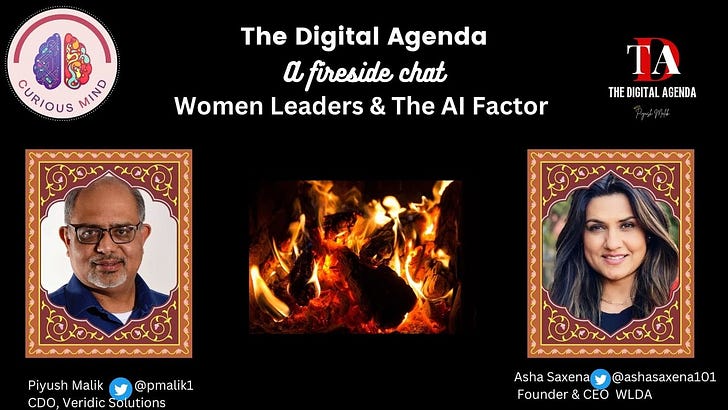





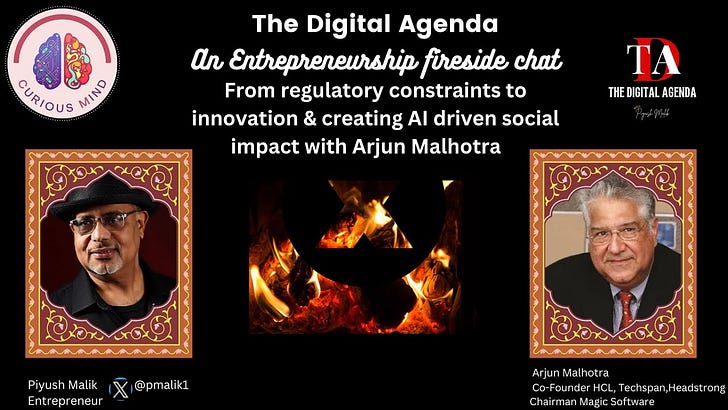

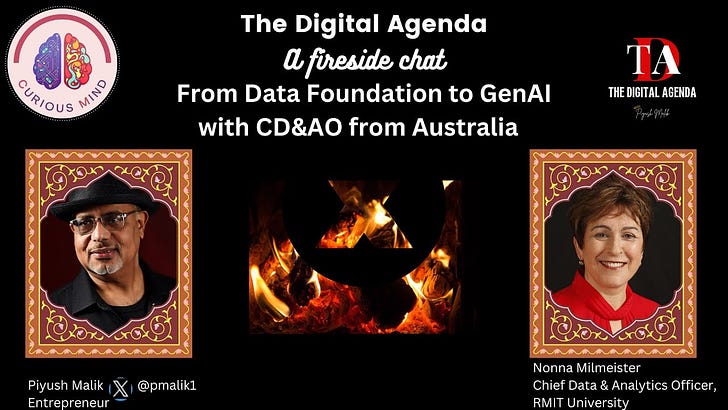
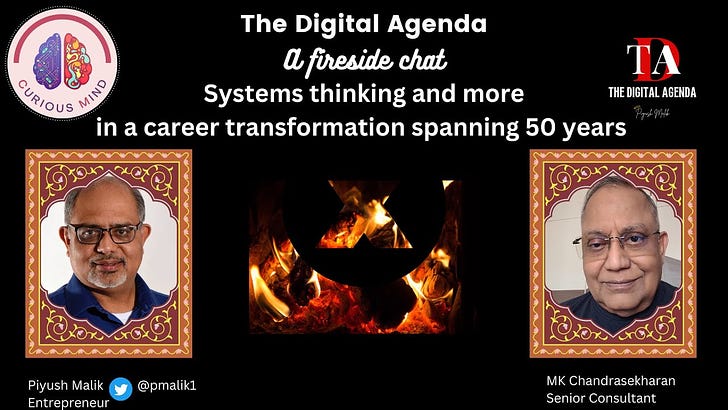
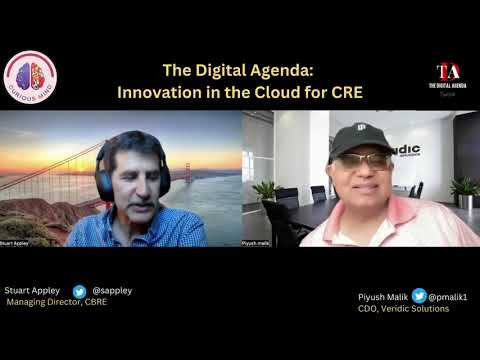
Share this post